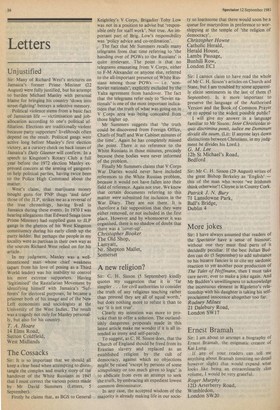Unjustified
Sir: Many of Richard West's strictures on Jamaica's former Prime Minister (22 August) were fully justified, but his attempt to burden Michael Manley with personal blame for bringing his country 'down into street-fighting' betrays a selective memory.
Political violence stems from a basic fact of Jamaican life — victimisation and joballocation according to one's political affiliation. Elections are traditionally violent because party supporters' livelihoods often depend on the result. Political gangs were active long before Manley's first election victory, as a cursory check on back issues of Jamaica's Daily Gleaner will confirm. In a speech to Kingston's Rotary Club a full year before the 1972 election Manley expressed concern at the arming of gangsters to help political parties, having twice been to the Police High Command about the matter.
West's claim, that marijuana money bought guns for PNP thugs 'and later' those of the JLP, strikes me as a reversal of the true chronology, having lived in Jamaica during these events. In 1970 I was hearing allegations that Edward Seaga (now Prime Minister) had supplied guns to JLP gangs in the ghettos of his West Kingston constituency during his early climb up the party ladder. But perhaps the people in my locality were as partisan in their own way as the sources Richard West relied on for his article.
In my judgment, Manley was a wellintentioned man whose chief weakness (apart from his love of posing as a Third World leader) was his inability to control his more extreme supporters. Having 'legitimised' the Rastafarian Movement by identifying himself with Jamaica's 'Sufferers' for electoral purposes, he became a prisoner both of his image and of the New Left economists and sociologists at the University of the West Indies. The result was a tragedy not only for Manley personally, but also for his country.
T. A. Hoare 14 Elms Road, Sutton Coldfield,
West Midlands
































 Previous page
Previous page